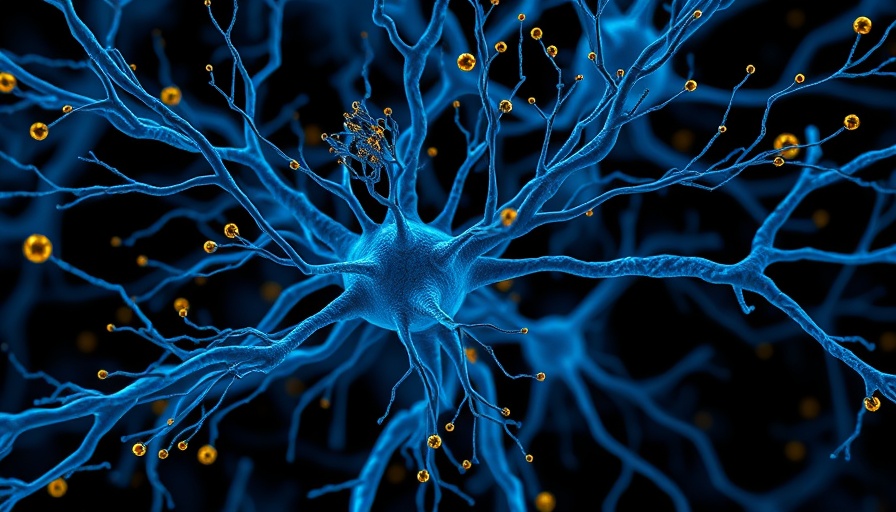
Understanding Amyloid Beta's Role in Alzheimer's Disease
Alzheimer's disease (AD), a progressive neurodegenerative disorder, is characterized by significant cognitive decline, which has been attributed to the accumulation of amyloid beta (Aβ) plaques in the brain. However, recent findings indicate that soluble forms of Aβ, including monomers and oligomers, are primarily responsible for neuronal degeneration and cognitive impairment. This emerging understanding underscores the necessity for targeted interventions that directly affect these harmful protein forms.
Novel Nanostructures: A Breakthrough in Alzheimer's Research
In a groundbreaking new study published in the Journal of the American Chemical Society, researchers from Northwestern University have developed engineered peptide amphiphiles that form nanofibers capable of binding Aβ molecules. This innovative approach serves to prevent Aβ from entering neurons—processes that are crucial for cellular survival and overall brain health. By halting the entry of these detrimental proteins, the engineered nanostructures can significantly increase neuronal resilience, offering a potential path to mitigate Alzheimer's progression.
The Mechanism Behind the Breakthrough
These peptide-based nanostructures operate through a unique mechanism of self-assembly, where the components combine into long, strand-like fibers. This design not only serves the purpose of trapping Aβ but also represents a lighter, more benign alternative to traditional therapies, as the peptide components naturally degrade into harmless substances. Dr. Samuel I. Stupp, the study's lead author, notes, "The molecules in this novel therapeutic concept break down into harmless lipids, amino acids, and sugars. That means there are fewer adverse side effects,” a significant advancement when compared to existing treatments.
Implications for Future Alzheimer's Treatments
The promising preliminary data, showing increased neuronal survival in vitro, heralds the potential of these nanostructures for future therapeutic applications. Experts believe that if similar effects can be observed in living organisms, this could revolutionize the approach to Alzheimer's treatment. The quest to provide avenues for reversing cognitive decline rather than merely addressing symptoms may soon find a foothold in these innovative therapeutic technologies.
The Balance of Innovation and Understanding
Despite the excitement surrounding these findings, it is essential for both scientists and the public to remain grounded. The application of these nanostructures has only been demonstrated in cell cultures thus far, emphasizing the need for extensive testing in animal models, followed by human trials. As history has shown, while laboratory successes are encouraging, translating these findings into clinical therapies is a complex and often lengthy process.
Broadening Perspectives on Alzheimer's Research
Moreover, the study touches on the divergent perspectives within the realm of biomedical research concerning Alzheimer's disease. While many researchers focus on clearing existing amyloid plaques from the brain, this new approach prioritizes the prevention of harmful protofibrils—which may ultimately lead to more potent therapeutic interventions.
What Can We Learn From This Research?
This latest research invites us to reflect on the broader implications of nanotechnology in health sciences. The intersection of biotechnology and nanotechnology holds vast potential for various applications beyond Alzheimer's. It emphasizes the importance of innovative research that moves beyond traditional paradigms and seeks new solutions to persisting health challenges. For those invested in the fields of health and wellness, staying informed on such advancements is critical. This ongoing evolution in understanding neurodegeneration is not merely a scientific progression; it also represents a beacon of hope for millions affected by degenerative diseases.
Conclusion: A Call for Awareness and Advocacy
As we witness advancements in Alzheimer's research, let us also advocate for holistic health knowledge. Engaging with and supporting emerging research can be crucial for empowering individuals affected by this devastating disease. Staying informed fosters community awareness and spurs action towards better funding and research opportunities in this vital area. Together, our collective push for knowledge, advocacy, and funding could catalyze the development of effective therapies to combat Alzheimer's disease.
 Add Row
Add Row  Add
Add 




Write A Comment